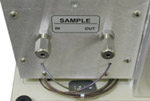
8610-0073
- Detect Low Sulfur Concentrations
-
Multiple Gas Analysis
AND Sulfur Analysis in one unit
- Uses just 1 Gas Sampling Valve and 3 Columns
- Temperature Programmable Column Oven
- Uses just 1 Gas Sampling Valve and 3 Columns
- Built-in, "whisper
quiet" Air Compressor
- 4 channel PeakSimple
Data System
- On-Column Injector
...on the compact 8610C chassis
 |
The Silcosteel sample loop is visible on the front of the valve oven. |
Many analysts require natural gas analysis for BTU value calculations or drilling and mudlogging applications. Frequently, sulfur compounds are also of interest.
Because low sulfur concentrations (<50ppm) are difficult to measure, SRI has enhanced our popular Mulitple Gas Analyzer GC systems to simultaneously monitor low levels of sulfur compounds. The additional hardware required is an FPD/FID detector, which selectively detects sulfur down to mid-ppb range, and a room temperature Silcosteel sample loop.
One reason sulfur is so difficult to measure is that it disappears on contact with hot stainless steel surfaces; even limited contact with a hot stainless steel loop will destroy any sulfur in the gas sample. Our solution is to use a Silcosteel-lined transfer line leading to a splitter, and a 60-meter thick film capillary column. While Teflon columns are sometimes also used for sulfur analysis, the natural gas analysis (using MoleSieve and Silica Gel) requires column temperatures of 250oC or higher. Since the sulfur column is located in the column oven, it is essential to use a column like the 60-meter capillary which can tolerate the higher temperatures.
|
8610-0073
|
Multiple Gas
Analyzer #1 + Sulfur GC with TCD, FID-methanizer and FPD/FID detectors,
built-in "whisper quiet" air compressor, 2-meter MoleSieve
and Silica Gel columns, 60-meter capillary column, and Silcosteel
sample loo
|
||||
|
8610-0273
|
Multiple Gas Analyzer #2 + Sulfur GC with TCD, FID-methanizer and FPD/FID detectors, built-in "whisper quiet" air compressor, 2-meter MoleSieve and Haysep-D columns, 60-meter capillary column, and Silcosteel sample loop | ||||
|
Call
for quotes: (0117) 230 5092
|
|||||
|
(VOLTAGE:
for 110VAC, use "part number-1" [ex:8610-0073-1] for 220VAC,
use "part number-2")
|
|||||
|
Options
& Upgrades: 6 channel USB PeakSimple
data system, Split/Splitless and PTV
injectors, additional gas sampling valves,
Thermal Desorber
|
|||||